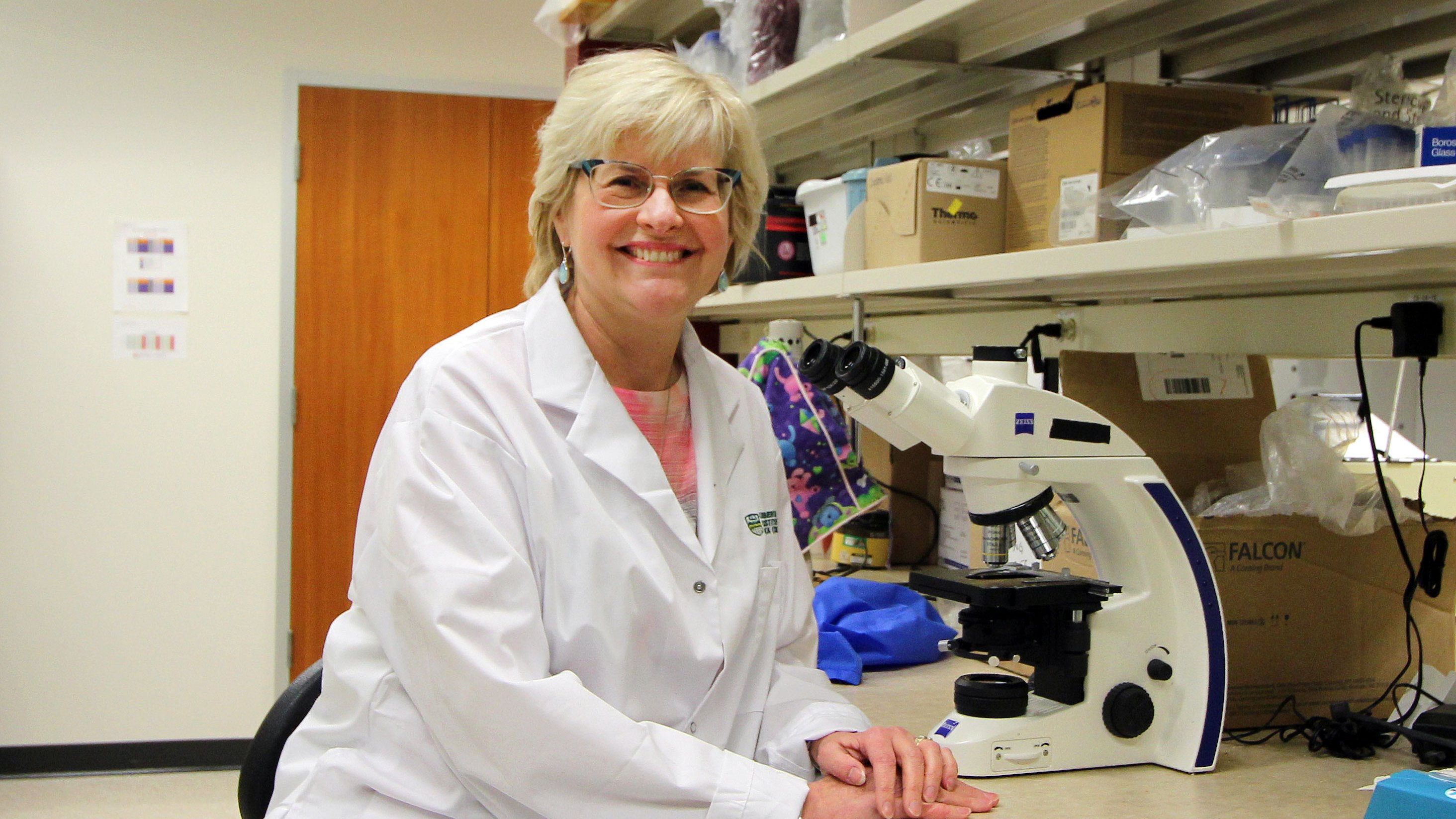Two decades ago, Catherine Field’s University of Alberta nutrition lab showed that specific fatty acids in breast milk during the crucial first period of life could program how the immune system responds to food allergens.
Her group looked at milk, egg and soy allergies—the ones babies tend to grow out of but can still cause real issues—and determined that the fatty acid DHA, found most commonly in seafood, was instrumental in suppressing not only these early allergies, but also other diseases like asthma and emphysema.
It was that work that led to DHA being added to infant formulas across North America.
“Immunology is in the centre of virtually every chronic disease,” said Field, researcher in the Faculty of Agricultural, Life & Environmental Sciences (ALES) and Canada Research Chair in Human Nutrition and Metabolism.
“Now we're spending a lot more time answering the question, exactly how does nutrition influence the immune system?”
Now, thanks to $420,000 from the federal government’s John R. Evans Leaders Fund (JELF) and matching funds from the Government of Alberta, Field, along with immunology researchers Caroline Richard from the Faculty of ALES and Sue Tsai from the Faculty of Medicine & Dentistry, will be able to purchase the equipment to determine the mechanism behind the impact of diet on immunity. The grant is part of $4.8 million in foundational research infrastructure for 23 U of A projects.
Richard, who holds the Canada Research Chair in Nutritional Immunology, and Tsai, the Canada Research Chair in Immunometabolism, will focus their efforts more on the inflammation that happens in obesity and how it's so related to all of the complications of obesity.
“My co-principal investigators are interested in how they could modify that inflammation through nutrition, or finding markers that could be targeted in different ways, whether it's by nutrition or by pharmaceuticals,” said Field.
Although Field was alone in this field of research, she said it is slowly gaining in popularity as supplements with immune-boosting claims are now a multibillion-dollar industry.
“The U of A is the only place in the country that has people doing work on nutritional immunology and metabolism,” she said.
“We're actually really looking for interventions that we could put into either clinical guidelines or policies.”
For instance, there are really no recommendations for moms focused on immune development for babies, Field said.
As well, she said allergies seem to be growing, whether we're just getting better at diagnosing them or there really are more allergies.
“It's a happy story that we're trying new things and understanding how they work, so that we can get these into recommendations for the public.”
U of A funded projects
Troy Baldwin, Faculty of Medicine & Dentistry
High dimensional single cell analysis platform to study the immune system in health and disease
$332,799
Daniel Charlebois, Faculty of Science
Mitigation of drug resistance in bacteria and pathogenic yeasts
$98,969
Patricia Dolez, Faculty of Agricultural, Life & Environmental Sciences
Weathering chamber for textiles, polymers and composites
$102,756
Catherine Field, Faculty of Agricultural, Life & Environmental Sciences
Nutritional immunology
$419,544
Casey Fowler, Faculty of Science
Laboratory for the discovery, characterization and application of bacterial toxins
$224,002
Maria Ioannou, Faculty of Medicine & Dentistry
A super-resolution live-cell imaging platform to study lipid dynamics in the brain
$266,550
Xiaoting Li, Faculty of Arts
Moving together—Language, body, and the surround in mobile interaction
$127,543
Alan Lynch, Faculty of Engineering
Control of multiple autonomous robotic systems in unstructured environments
$419,503
Patrick MacDonald, Faculty of Medicine & Dentistry
Pancreatic islet deep phenotyping core
$267,307
Meghan Riddell, Faculty of Medicine & Dentistry
Mechanisms of placental epithelial stress response in homeostasis and pathology
$132,091
Dan Romanyk, Faculty of Engineering
Investigating the multi-level mechanical behaviour of advanced materials under multi-axis loading
$277,322
Warren Wakarchuk, Faculty of Science
A cell culture facility for glycosyltransferase application to therapeutic protein improvement
$187,556
Lisa Willis, Faculty of Science
The role of polysialic acid in regulating the immune response in health and disease
$178,260
Amit Bhavsar, Faculty of Medicine & Dentistry
Mitigating adverse drug reactions in childhood cancer therapy with precision
$127,176
Michael Hendry, Faculty of Engineering
Dynamic simple shear testing system for local pore pressure measurements within developing shear planes
$80,000
Jing Liu, Faculty of Engineering
High temperature pressurized fluid system for sustainable and renewable energy advancement
$125,000
Jason Plemel, Faculty of Medicine & Dentistry
Establishing a multiple sclerosis lab studying white matter injury and repair
$164,964
Aminah Robinson Fayek, Faculty of Engineering
Construction innovation centre lab for intelligent and resilient automation and technology
$312,733
Leila Hashemian, Faculty of Engineering
Laboratory investigation of cold temperature properties of asphalt mixes
$85,514
Amina Hussein, Faculty of Engineering
Smart femtosecond microbeamline for ultrafast applications
$274,649
Anna Phan, Faculty of Science
Behavioural and neural imaging infrastructure for studying the neurobiology of forgetting and memory suppressors
$400,326
Arvind Rajendran, Faculty of Engineering
Research infrastructure for adsorptive gas separation for energy and environment
$100,000
Mahdi Tavakoli, Faculty of Engineering
A mobile robotic platform for continuity of health-care service delivery during and following the COVID-19 pandemic
$130,695
